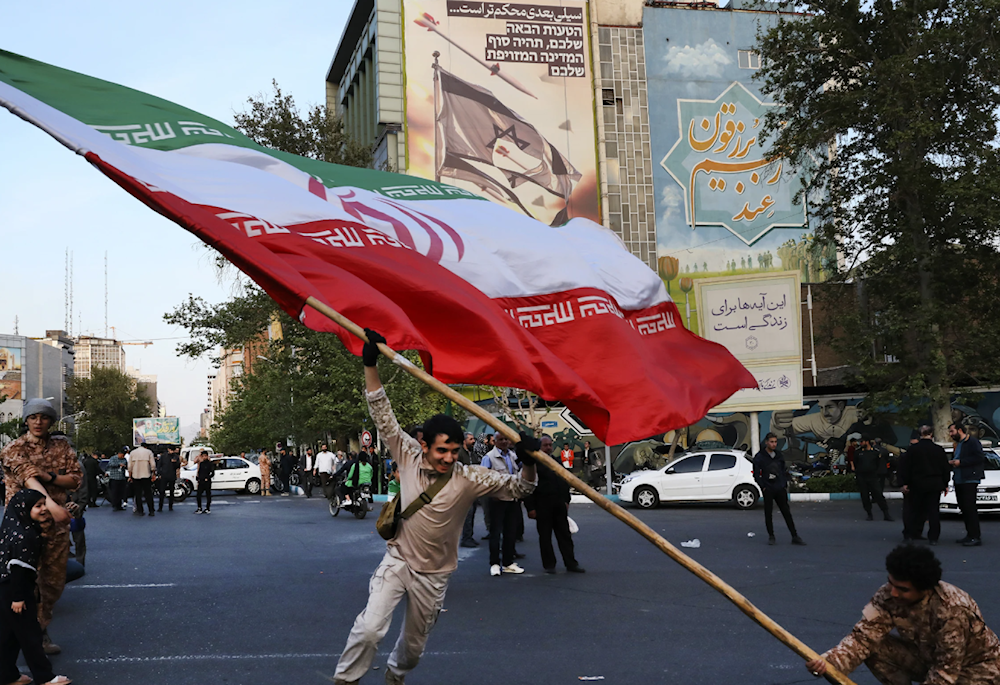How 'Israel’s' freedom of action against Iran may be jeopardized
According to Greg Priddy, until recently, "Israel" has had a great deal of leeway in its activities in Syria, Lebanon, and Iraq.
-

Demonstrators wave an Iranian flag at Felestin Sq. in Tehran, Iran on April 15, 2024. (AP)
Following Iran's unprecedented strikes on "Israel", Israeli officials have made it clear that they will respond forcefully, rejecting President Joe Biden's call to "take the win." However, "Israel" has claimed that its assault against Iran will be tailored to minimize further escalation.
A US official said Sunday that Washington would "not participate" in any potential counterattack by "Israel", while British Foreign Secretary David Cameron and French President Emmanuel Macron also cautioned against retaliation.
On Monday, Axios reported that "Israel's" Security Minister Yoav Gallant informed US Defense Secretary Lloyd Austin over the phone about Israeli plans to respond to Iran's recent retaliatory attack.
Greg Priddy writes in The National Interest that Iran's readiness to strike "Israel" directly from Iranian land indicates a substantial shift. Until recently, "Israel" has had a great deal of leeway in its activities in Syria, Lebanon, and Iraq, targeting both Resistance factions and Iranian military units directly outside Iranian territory without fear of direct Iranian repercussions. This freedom of action may result in an uncontrolled escalation into a regional war since Iran has shown it is "no longer willing to maintain strategic patience," changing the rules of the game.
Priddy believes that "Israel" could also plainly suffer in certain aspects in a fully escalated regional battle since Hezbollah and Iran are capable of causing significant damage via missile attacks. In the most recent attack, Iran abstained from deploying its most modern missile systems, and the occupation cannot hope to intercept as many missiles in a regional war.
Public opinion in the US may also be opposed to any participation in the region, particularly if the repercussions include an economically harmful oil price surge.
While escalation in a regional battle may lead to Israeli and US strikes on Iran's nuclear program, the aftermath of the war would not be favorable for controlling the program, Priddy believes that the US and "Israel" cannot stymie nuclear developments since Donald Trump withdrew from the JCPOA in 2018.
Furthermore, Priddy emphasizes that Iran's "playing with fire" may be effective since "Israel's" past freedom came when Iran's nuclear program was far less advanced and Iran only possessed a few missiles.
He also notes that the recent rewarming of Saudi-Iranian diplomatic relations may have contributed to Iran's power shift, citing that the 2019 oil infrastructure strikes by Iran, along with Trump's reluctance to engage in a direct battle with Iran, made Riyadh, and subsequently "Israel", realize that the power balance has indeed shifted.
Majority of Israelis want to de-escalate tensions after Iran strike
The majority of Israelis (52%) believe that an immediate response to Iran's retaliatory strike is not desired, but rather prefer "to close the current round of hostilities," a recent poll conducted by the Hebrew University of occupied al-Quds revealed, as reported by the Financial Times.
"Everyone is on board with the [Gaza war] goals. But we see a very different path here" with Iran, Nimrod Zeldin, who conducted the study, told FT. "Iran is more complicated."
According to the report, the clear-cut split is reflected in the "tortuous" debate within the war cabinet led by Prime Minister Netanyahu. Experts argue that the window for an immediate response is closing further as time passes.
One Israeli source informed the Financial Times that the regime has "in principle" taken a decision to respond. "But the timing and scope of such an operation remain unknown," the report says, noting that international pressure from allies, namely the US and the UK, is causing further delay.
This lack of a "clear signal" from the war cabinet has left the public "in limbo", with daily life returning to "an uneasy semblance of wartime normalcy." For instance, just two days after the Iranian response, tens of thousands of people attended an open-air concert in "Tel Aviv" on Tuesday. But the army warned that restrictions can be reimposed swiftly if the regime decides that the time has come to initiate a response.

 4 Min Read
4 Min Read








